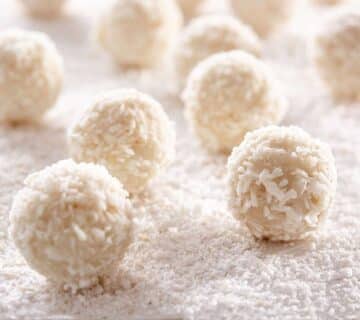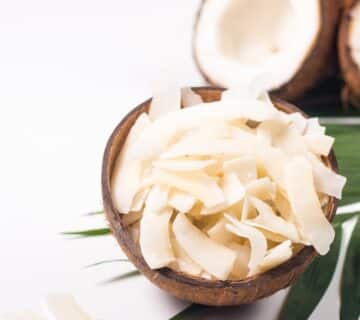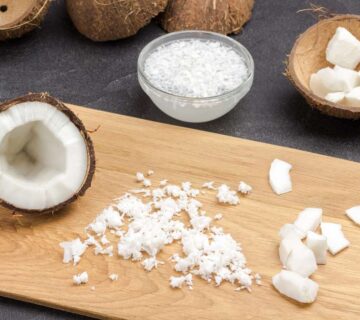When managing a diet for irritable bowel syndrome (IBS) or other digestive concerns, understanding the FODMAP content of foods is crucial. If you enjoy coconut in various forms, you might be wondering, is desiccated coconut low FODMAP?
This question is important for anyone following a low-FODMAP diet to minimize symptoms like bloating, gas, or abdominal pain. In this article, we’ll explore what FODMAPs are, delve into whether desiccated coconut fits into the low-FODMAP category, and discuss how it can be incorporated into your diet.
What Are FODMAPs?
FODMAPs are a group of short-chain carbohydrates and sugar alcohols that can be difficult for some people to digest. The acronym stands for Fermentable Oligo-, Di-, Mono-saccharides, and Polyols.
These compounds include oligosaccharides (such as fructans and galactans, found in foods like wheat, onions, and legumes), disaccharides (like lactose), monosaccharides (such as fructose), and polyols (present in some fruits and artificial sweeteners).
When these substances are poorly absorbed in the small intestine, they ferment in the large intestine, leading to symptoms such as bloating, gas, and abdominal pain, especially in individuals with irritable bowel syndrome (IBS) or other digestive disorders.
Is Desiccated Coconut Low-FODMAP?
Desiccated coconut is generally considered low-FODMAP, making it a suitable option for those managing digestive issues such as irritable bowel syndrome (IBS). This dried and finely shredded coconut contains minimal amounts of fermentable carbohydrates that are problematic for people with FODMAP sensitivities.
Unlike some other coconut products, desiccated coconut has a low content of oligosaccharides, disaccharides, monosaccharides, and polyols, which are the compounds that can contribute to digestive discomfort.
As a result, it can be included in a low-FODMAP diet without significantly increasing the risk of symptoms like bloating, gas, or abdominal pain. However, as with any food, it’s important to monitor individual responses and consult with a healthcare provider or dietitian to ensure it fits well with your specific dietary needs.
Using Desiccated Coconut in Your Diet
Desiccated coconut is a versatile ingredient that can be incorporated into various dietary plans due to its nutritional benefits and adaptability. Here’s how you can use it in different types of diets:
1. Low-FODMAP Diet
For those with irritable bowel syndrome (IBS) or other digestive sensitivities, following a low-FODMAP diet is crucial for managing symptoms. Desiccated coconut is an excellent choice for this diet as it is low in FODMAPs, meaning it contains minimal levels of fermentable carbohydrates that can trigger digestive issues.
It’s a suitable ingredient for adding flavor and texture to meals without exacerbating symptoms like bloating or gas. For example, it can be incorporated into smoothies, yogurt, or as a topping for salads and baked goods.
2. Gluten-Free Diet
Desiccated coconut is naturally gluten-free, making it an ideal ingredient for individuals with gluten intolerance or celiac disease. It provides a safe alternative to gluten-containing ingredients and can be used in a variety of gluten-free recipes.
Adding desiccated coconut to baked goods like muffins or cookies not only adds a pleasant texture but also enhances flavor. It can also be used as a coating for gluten-free chicken or fish, providing a crunchy and flavorful crust.
3. Low-Calorie Diet
With approximately 71 calories per 1/4 cup serving, desiccated coconut is a relatively low-calorie food, making it a good option for those aiming to manage their calorie intake.
It can be used in moderation to add flavor and texture to meals without significantly impacting overall caloric consumption.
For example, sprinkling a small amount of desiccated coconut on top of a fruit salad or yogurt can enhance the dish’s nutritional profile without adding excessive calories.
4. Keto Diet
Desiccated coconut is a low-carbohydrate food, making it suitable for those following a ketogenic (keto) diet. The keto diet emphasizes high fat and low carbohydrate intake to achieve and maintain ketosis, a metabolic state where the body burns fat for fuel instead of carbohydrates.
Desiccated coconut fits well into the keto diet due to its low carbohydrate content and high fat content. It can be used in keto-friendly desiccated coconut recipes such as coconut flour pancakes, keto bars, or as a topping for keto smoothies to add a rich, nutty flavor.
5. Paleo Diet
As a fruit-derived ingredient, desiccated coconut is compliant with paleo diet principles, which focus on consuming foods that were available to our pre-agricultural ancestors.
It is a natural, whole food that fits within the guidelines of the paleo diet, making it a good choice for those who avoid processed foods and grains. Desiccated coconut can be used in a variety of paleo recipes, including energy balls, paleo muffins, or as a coating for paleo-friendly chicken or fish dishes.
6. Dairy-Free Diet
Desiccated coconut is also a valuable ingredient for individuals who are lactose intolerant or following a dairy-free diet. It can be used to replace dairy ingredients in recipes, providing a creamy texture and rich flavor without the lactose.
For example, it can be used in dairy-free desserts such as coconut milk ice cream or coconut-based chocolate truffles. Additionally, desiccated coconut can be added to dairy-free smoothies or used as a topping for dairy-free yogurt.
Include This Low-FODMAP Ingredient in Your Meals!
Desiccated coconut can vary depending on individual tolerance and portion size. Generally, desiccated coconut is low in FODMAPs and can be a suitable choice for those following a low-FODMAP diet.
Desiccated coconut health benefits are numerous, making it a valuable ingredient in a variety of diets. If you’re looking for premium desiccated coconut, Sari Coconut offers fresh, high-quality desiccated coconut that is perfect for a wide range of food industries.
Sari Coconut, a leading supplier coconut from Indonesia, is poised to meet the growing global demand for high-quality desiccated coconut. Trust Sari Coconut to be your reliable partner in bringing the health benefits of desiccated coconut to markets across the globe!
FAQ
Can I eat desiccated coconut if I have IBS?
Yes, desiccated coconut is typically safe for people with IBS, but monitor your personal tolerance.
How much desiccated coconut can I consume on a low-FODMAP diet?
Moderation is key. Consuming it in typical serving sizes (e.g., 1/4 cup) is usually fine.






